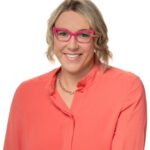
At Tucson Breast Health Specialists, we understand that learning you have a BRCA mutation can bring a mix of emotions. Knowing your risk allows you to take proactive steps. This blog post will discuss preventative measures, acceptance, and treatment options for individuals diagnosed with BRCA mutations.
Understanding BRCA Mutations
BRCA1 and BRCA2 are genes that produce proteins that help repair damaged DNA. When these genes mutate, they may not function correctly, leading to an increased risk of breast, ovarian, and other cancers. Genetic testing can identify these mutations, allowing for informed decisions about prevention and treatment.
Prevention Strategies
For individuals with BRCA mutations, several preventative measures can significantly reduce cancer risk:
- Increased Surveillance: Regular and more frequent screenings are crucial. This includes annual MRIs and mammograms, often starting at a younger age than typically recommended.
- Prophylactic Surgery: Some individuals opt for prophylactic (preventative) surgeries, such as a mastectomy (breast removal) and/ or oophorectomy (ovarian removal), to drastically reduce their risk.
- Medications: Certain medications, like hormone-blocking drugs, can help lower breast cancer risk in some women with BRCA mutations.
- Lifestyle Modifications: Maintaining a healthy lifestyle through diet and exercise can support overall health and potentially reduce cancer risk. Following a plant-based diet, reducing alcohol intake, quitting tobacco, losing weight, and regular exercise all help to reduce the risk of developing breast cancer.
Acceptance and Support
Coming to terms with a BRCA mutation diagnosis can be challenging. It’s essential to allow yourself time to process the information and seek support from various resources:
- Genetic Counseling: Meet with a genetic counselor to fully understand the implications of your BRCA mutation and discuss your options.
- Support Groups: Connecting with others who have BRCA mutations can provide emotional support and valuable insights.
- Mental Health Professionals: Therapists specializing in coping with genetic predispositions can offer guidance and strategies for managing anxiety and stress.
Tucson Breast Health Specialists offers supportive care services on their website to help you navigate the emotional aspects of a BRCA diagnosis.
Treatment Options
While the focus is on prevention, early detection is still key. If cancer does develop, treatment options are available and continually advancing. These options may include surgery, chemotherapy, radiation therapy, targeted therapy, and immunotherapy.
Expertise of Dr. Michele Ley
At Tucson Breast Health Specialists, Dr. Michele Ley is dedicated to providing expert care for individuals with BRCA mutations. With her extensive experience in breast surgery and commitment to personalized treatment plans, Dr. Ley can guide you through every step of the process, from risk assessment to preventative measures and, if necessary, treatment.
We also offer high-risk evaluation and treatment, including genetic testing, to help you understand your risk and develop a tailored plan.
Take the Next Step
Knowing you have a BRCA mutation empowers you to take control of your health. At Tucson Breast Health Specialists, we’re here to provide the information, support, and care you need to make informed decisions and live a healthy life. If you have a known genetic mutation, including BRCA, please contact us today to schedule an appointment. We are committed to providing compassionate and expert care to help you navigate your journey with confidence.
Michele Ley, MD, FACS
Dr. Michele Ley, a breast surgical oncologist in Tucson since 2006, combines compassionate care with cutting-edge techniques to provide personalized treatment plans for breast cancer and high-risk patients. With a medical degree from St. Louis University, residency at the University of Arizona, and fellowship at UC San Francisco, Dr. Ley is board-certified in General Surgery and a member of the American Society of Breast Surgeons. Her experience as a medical director for breast programs and her own journey as a breast cancer survivor at age 44 uniquely position her to offer empathetic and expert care to her patients.






